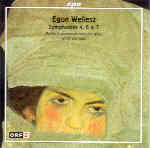Egon Wellesz achieved a measure of success in his adopted homeland of Britain as a distinguished musicologist, but like so many Jewish refugees forced to flee the continent after Hitler’s rise to power, the Austrian Wellesz was a composer of distinction who remained true to his Viennese roots. His music flows straight out of Mahler and that wonderful fin-de-siècle school of late-Romantic/Expressionist masters. In the opening movements of the Fourth and Sixth symphonies, the Mahlerian funeral march appears with unapologetic intensity. You won’t find in Wellesz Mahler’s expansive structures–these symphonies are all written in three or four brief movements. Nor does he exploit the Bohemian or folk-music angle to any great degree, and there’s little time for waltz music or parodies of the Ländler. But in all other respects–the emotional range, the pellucid orchestration, the fondness for themes exposed as contrapuntal dialogues between orchestral sections–this is the real deal.
In later symphonies (and–surprise!–he wrote nine of them), Wellesz begins to exploit a free serial technique that comes to sound something like leaner, less clotted Berg. The thrust of his argument is always easy to follow because while the thematic material may be atonal, its clear rhythmic foundation, easily recognized repetitions, and the distinction of the tunes themselves always makes it perfectly clear where the musical argument is going. Conductor Gottfried Rabl, who spent a great deal of time preparing clean scores and parts for these performances, interprets all three works as a labor of love, and he gets extremely secure playing from the Vienna Radio Symphony Orchestra. The engineers capture the proceedings in rich, very natural sound with a solid bass foundation–crucial in this music.
It’s clear with every newly recognized and performed composer from this period that a legacy of fantastic richness still awaits discovery. It’s funny now to read “music history” or “music appreciation” in light of the past decade of CD releases and to still see statements from purported musical “authorities” to the effect that “Mahler had no successors” and “the Viennese symphonic tradition ended with Schoenberg, Berg, and Webern.” The fact is that music history as currently practiced, particularly for Germany/Austria, needs a thorough re-write now that we can actually listen to previously unknown and unheard composers, discovering what was really happening in the period from Mahler’s death to Hitler’s rise. As for Wellesz, Orfeo also has released his marvelous pre-exile opera Die Bakchantinnen, and together with this disc they mark him out as an artist of the first rank. The next installment in what will be a complete Wellesz symphony cycle is due out shortly, and I can hardly wait. [8/14/2003]
































